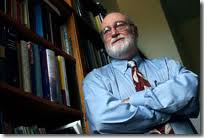Even at a school like Conn that has small classes and accessible faculty, it can be easy to forget that our professors are people, too. Among their pedagogical rants of wisdom and life-altering comments in the margins of essays, it’s sometimes hard to see any speck of infallibility among those whose jobs are to be bastions of knowledge in our odd collegiate universe. Those who attended the Glory Days Panel on October 26, however, were reminded that professors are indeed people— people who used to find themselves in the very places that average college students find themselves in today.
Professors Catherine McNicol Stock (History; BA, MA, PhD Yale University), Ronald J.O. Flores (Sociology; AB, AM Fordham University; PhD Brown University), Eugene V. Gallagher (Religious Studies; BA LaSalle University; MA, PhD University of Chicago) and Jason A. Nier (Psychology; BA The Pennsylvania State University; MA, PhD University of Delaware) stepped away from their usual roles as academic educators for an hour to act instead as quasi-life coaches, and spoke about the ways in which their academic and professional careers landed them the holy grails of teaching positions. Surprisingly, becoming a professor doesn’t mean you have to be incessantly buried in your work (at least as an undergraduate), and it doesn’t mean you have to always be the perfect “A” student. Professor Stock, for example, skipped her all-important junior seminar at Yale, despite the fact it was taught by her department chair. The activity that was more important at the time? Varsity soccer. Although she went on to receive a major American Studies award for her senior honors thesis, this still didn’t seal her fate as a history professor. As Stock noted, it wasn’t until after she went to graduate school, following time spent as an elementary school teacher, that she realized that teaching at the collegiate level was her true calling.
Professor Nier thought that he would be forever doomed to work in the warehouses of his family’s dental supply business after spending three college summers there. A self-proclaimed perennial late-bloomer, Nier eventually found himself on a more academic track, but it didn’t always look like he was destined for greatness.
Professor Flores knew early on that he wanted to teach, but it took him a little while to make it there. He spoke about a previous job working for the Census Bureau of New York, where he helped come up with the first methodology for counting the homeless in the 1990 census. While Flores spoke passionately about public service, his dedication didn’t stop him from sending out his teaching credentials every spring in the hope of being whisked away into the world of teaching.
Professor Gallagher had much to say about his stint at the University of Chicago. Likening his time spent at the university to a tour of duty in the military, Gallagher admitted that he was tempted to get back in his truck and drive home even on the first day when he was one of the ostracized few who didn’t know how to navigate the brutal culture.
Learning from people with experience is always enlightening; hearing how four now successful individuals found their way into a profession that I hold in the utmost respect was entirely refreshing. While mistakes and tragedies are inevitable, those who use these to their advantage find the most good.
Taking advantage of the connections that only college can provide – both scholarly and otherwise – is always beneficial. Expanding academic diversity and intellectual curiosity can sometimes be better than striving for marketability. A particularly resonating word of advice came at the close of the panel and from Professor Gallagher, who has been teaching at Conn for more than thirty years. In the words of Gallagher, “Watch the people who are the best at what they do. The ones that truly invest themselves. See what it takes to be successful in the long term.” Luckily, we have our professors to look to for this. •










